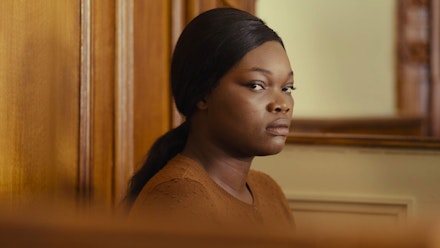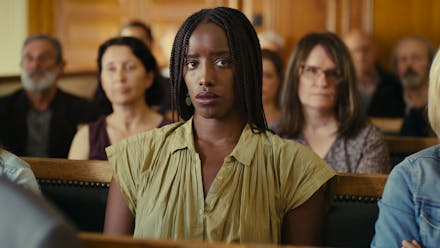There’s an accepted objectivity to raw filmed footage. It’s one of the strongest pieces of evidence that can be presented in a legal case, and it is often easier to believe than human testimony. In 2016, Alice Diop, a French filmmaker no stranger to raw footage in documentaries including Vers la tendresse (2016) and Nous (2020), attended the trial of Fabienne Kabou, charged with killing her infant daughter in 2013. Inspired to tell the story but without being able to film the actual events, Diop turned her hand to narrative cinema.

In Saint Omer — largely filmed as raw film footage, the techniques of documentary applied to fiction —Diop is deeply conscious of her own subjectivity, which in turn becomes an in for the audience. Her fictional stand-in, Rama, deftly played by Kayije Kagame, is a writer whose immediate thought is that the case of a mother murdering her 15-month-old daughter would suit a modern retelling of the Ancient Greek tragedy Medea by Euripedes. We see Rama pondering over the text, watching Maria Callas play Medea in Pier Paolo Pasolini’s 1969 film adaptation, trying to figure out how she might connect to it through her own complicated feelings around motherhood thrown up by the trial.
That is where the power of Saint Omer lies. We watch and listen to Guslagie Malanga delivering an impeccably nuanced performance as the convicted Laurence Coly, and her defence barrister, played by Aurélia Petit. Cinematographer Claire Mathon, who shot Céline Sciamma’s Portrait Of A Lady On Fire, holds the frame uncomfortably close as Caroline Shaw’s breathy ‘Courante’ plays on the soundtrack to evoke the claustrophobic atmosphere of the small courtroom. These filmic dimensions are new to Diop’s cinema, but they raise philosophical questions, essentially framing the audience as Laurence’s jury. Saint Omer tackles the unconscious biases surrounding cultural difference directly in a supposedly objective legal system.
